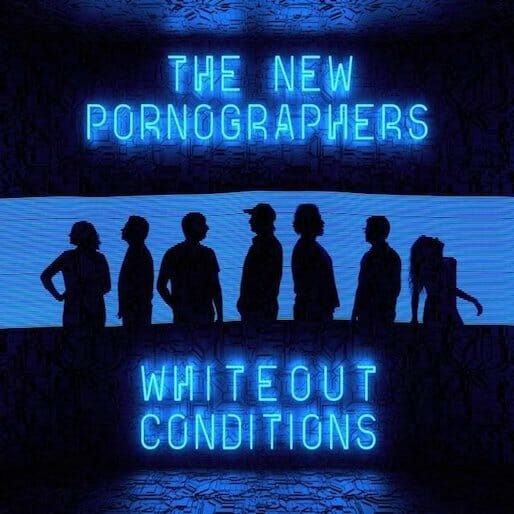Introducing Endless Mode: A New Games & Anime Site from Paste
The New Pornographers have spent their career seesawing between two sides of their collective musical personality, contrasting straightforward peppy, poppy records—Mass Romantic (2001), Electric Version (2003) and 2014’s Technicolor Brill Bruisers—with melodic, less accessible and at times gratuitously weird LPs (2005’s Twin Cinema, Challengers from 2007 and 2010’s Together).
Whiteout Conditions breaks the tie, unmistakably throwing its lot in with the former group. It’s a fitting introduction to spring, a blast of synthesizers and harmony and aural smiles. They sprinkle the album with unconventional touches, but they avoid the self-conscious oddballism of, say, “Spyder,” instead relying on the strength of AC Newman’s writing and the band’s performance. No doubt some of the record’s pop emphasis stems from the recent departure of songwriter/singer/instrumentalist/Vancouver musical generalist Dan Bejar. Though he only contributed a few songs per album, the erstwhile Destroyer leader’s enigmatic lyrics, skewed melodies and unusual singing voice (at times, he seemed to channel three different Dylan phases simultaneously) offset the more accessible tracks, giving each record more texture, if slightly less cohesion.
While Newman’s knack for melodies is on full display here—every song on Whiteout Conditions invites head-bobbing or singing along—the album’s success stems at least as much from his penchant for experimenting with arrangement and structure. Verses flow into choruses with such little fanfare, it hardly seems fair to call them choruses. Instead, the songs come off as collages of uniformly important, but musically distinct melodic lines. The daydreamy album opener “Play Money” shifts from verses into the refrain “For a fee, I’ll fight any foe” with no flourish at all: no drum fill, no chord change, not even a cymbal crash. Instead, the song glides conversationally from section to section over a steady synth-pop heartbeat.
In the past, The New Pornographers have generally laid spidery keyboard hooks on top of a guitar-based foundation. On Whiteout Conditions, though, the band opts for a more explicitly new-wave feel; synths provide the bulk of the sound, with splashes of guitar for color. Sonic references to the ‘80s abound: the title track owes a debt to OMD’s “If You Leave,” while “High Ticket Attractions” and “Darling Shade” wouldn’t sound out of place on The Breakfast Club soundtrack.
If the NPs have always benefitted from the strength of their singers, Whiteout Conditions absolutely revels in their versatility. Newman, Kathryn Calder and the always arresting Neko Case trade lead duties throughout as well as pitching in harmonies, countermelodies and bright vocal chords, often in a song’s first minute. “Second Sleep” opens with a collage of vocal samples, parading their six voices (bassist John Collins, new drummer Joe Seiders, and keyboard player Blaine Thurier all provide rock-solid backing vox) past the listener, savoring the diversity of the instruments at their disposal. Elsewhere, “Juke” features a staccato three-part arrangement in which Case, Newman and Calder alternately harmonize and provide rhythm for one another, and the sparse instrumentation of “We’ve Been Here Before” confirms that the band’s voices alone can carry a song.
Three years ago, an elated Newman described Brill Bruisers as his “celebration record,” a return to more straightforward, listener-friendly power pop after the self-conscious eccentricity of the last three albums. Whiteout Conditions keeps that celebration going. And while The New Pornographers’ appealing quirks abound, their melodic gifts rightfully steal the show.
